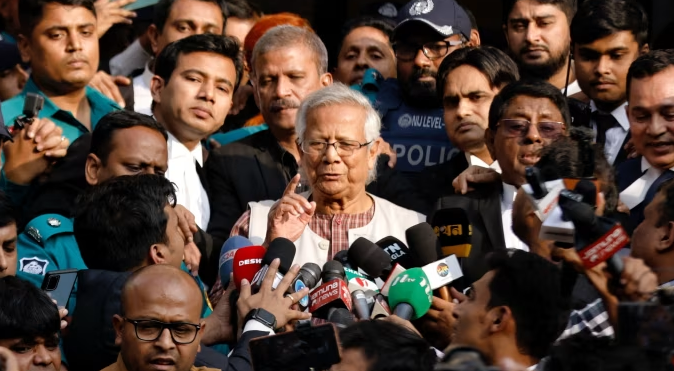In a decisive move to address the political turmoil in the country, Nobel laureate economist Dr. Muhammad Yunus has been appointed to head the next interim government. This decision was finalized during a meeting at Bangabhaban on Tuesday night, involving President Mohammed Shahabuddin, the chiefs of the three services, and the coordinators of the Student Against Discrimination (SAD).
The interim government aims to fill the power vacuum left by weeks of unrest, which resulted in 300 deaths. A preliminary list of 10-15 interim members, including civil society and student representatives, has been submitted, with finalization expected shortly as the nation prepares for elections.
Also Read: Hamas Elevates Yahya Sinwar to Lead Role After Haniyeh’s Assassination in Tehran
The SAD coordinators, who led the job quota reform movement, arrived at Bangabhaban at 6:00 pm, followed by the heads of the three forces at 7:30 pm. After an extensive meeting, the decision to appoint Dr. Yunus was made. Coordinator Nahid Islam, speaking to the media around 12:30 am, confirmed the proposal of Dr. Yunus and the president’s agreement. He added that a list of 15 potential interim members, comprising students and civil society members, would be discussed with various political parties soon.
Dhaka University professor Asif Nazrul, present at the meeting, remarked on the unusual circumstances of forming this government, highlighting the possibility of constitutional legitimacy. The duration of the interim government remains undecided. Another attendee, Professor Tanzimuddin Khan of Dhaka University, was also present.
On Tuesday morning, student movement leaders proposed Dr. Yunus’ name via a video message. Sources indicate that Dr. Yunus could assume his role today or Thursday. Meanwhile, the country has been without a formal government for two days following the resignation of Sheikh Hasina’s government, creating widespread instability.
The demand for an interim government has been strong among students and political party leaders, including the Bangladesh Nationalist Party (BNP). Consensus on Dr. Yunus’ appointment has been reached among various parties, including BNP, Bangladesh Jamaat-e-Islami, and Ganatantra Mancha.
Dr. Yunus, currently in Paris, expressed his willingness to lead the interim government, emphasizing his commitment to the students’ cause. He is expected to return to the country shortly to assume his new role.
There is ongoing speculation about the composition of the interim government, with discussions focusing on including professionals, university teachers, lawyers, civil society representatives, and former military and civilian bureaucrats. The final list remains unconfirmed, and the opinions of Dr. Yunus and the army will be pivotal.
The caretaker government system, abolished in 2011, might serve as a model for the new interim framework. Following the dissolution of parliament on Tuesday, the country currently lacks elected representatives, making the new government entirely unelected.
Former Prime Minister Sheikh Hasina resigned on Monday and has since left for Delhi, India, ending her 15-and-a-half-year tenure.



